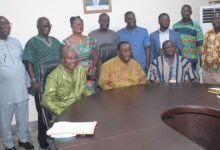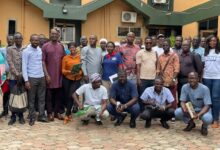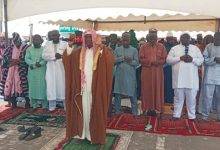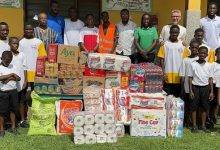
The Greater Accra Metropolitan Assemblies (GAMA) and Greater Kumasi Metropolitan Assemblies (GKMA) Sanitation Project of the World Bank, under the Ministry of Sanitation and Water Resources, is exploring the re-use of human waste for the production of safe organic fertiliser for farming in the country.
According to the Sanitary Engineer at the Greater Accra Metropolitan Assembly (GAMA), Gabriel Engmann, plans were far advanced to collect the faecal sludge from the biodigester toilet system and convert them to organic fertilisers for farming in the country.
He was speaking to the Ghanaian Times at a three-day media training on Environmental Sanitation at Ada Foa, in the Greater Accra Metropolis.
The objective of the workshop was to review previous trainings and equip media practitioners (GKMA/ GAMA Project media group) with skills in sanitation media advocacy to influence social behaviour and attitude towards enhancing improved environmental sanitation.
Mr Engmann indicated that faecal sludge, rich in nutrients and organic matter, would go through proper treatment to remove any pathogens, make them dry and used to produce the fertiliser.
He explained that the manure would be used on pilot basis on school farms to produce food for the schools to feed the students, “and based on the success, mass production would be considered”.
The World Bank funded project, which started in 2015, is aimed at increasing access to improved sanitation and water supply in the GAMA and GKMA with emphasis on low income communities and to strengthen management of environmental sanitation in the GAMA and GKMA.
It is part of government’s determination to providing pragmatic measures to find a lasting solution to the water and sanitation problems in the GAMA and GKMA.
The parent GAMA Sanitation and Water Project was successfully implemented from August 2014 – December 2020 with about 240,212 people having access to improved household toilets.
In Kumasi (GKMA), the project is being implemented in eight Metropolitan and Municipal Assemblies including Asokwa, Oforikrom, Old Tafo, Suame, Kwadaso, and the Asokore Mampong Municipal Assembly (AMMA).
Under the project, 30,000 household toilet facilities would be provided for people with low income in the GKMA, while about 5,000 households would also get connected to water supply support.
The bio-digester toilet system is the main containment technology provided under the Project for beneficiary households.
It works by rapidly breaking down faecal matter with the assistance of micro and macro-organisms and bulking materials such as coconut coir and wood chips.
FROM KINGSLEY E. HOPE, ADA FOA







